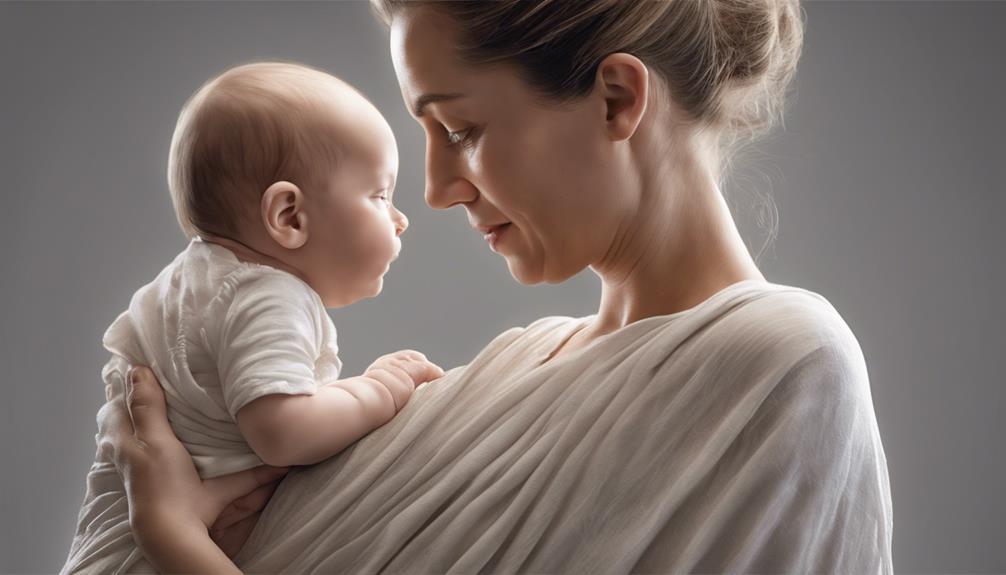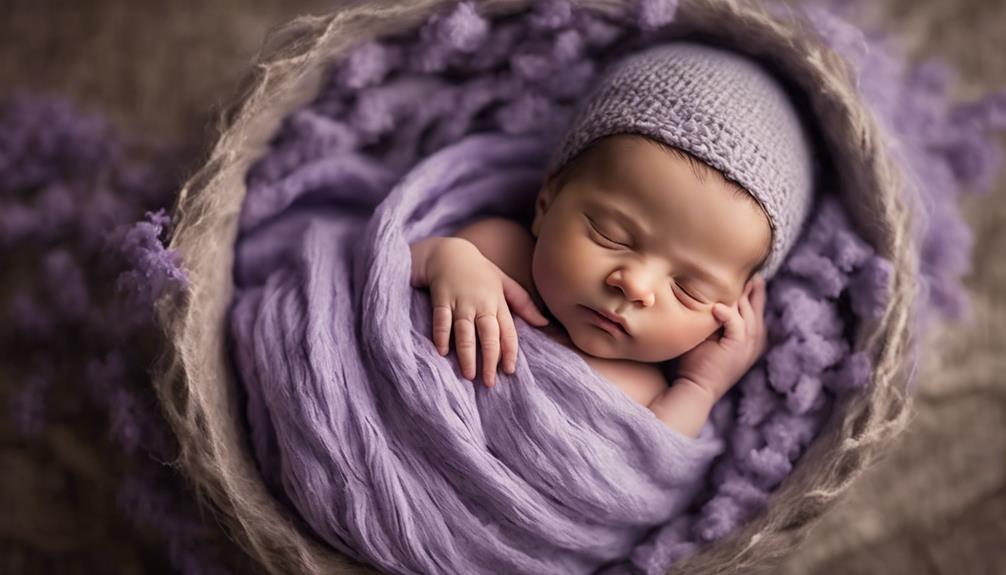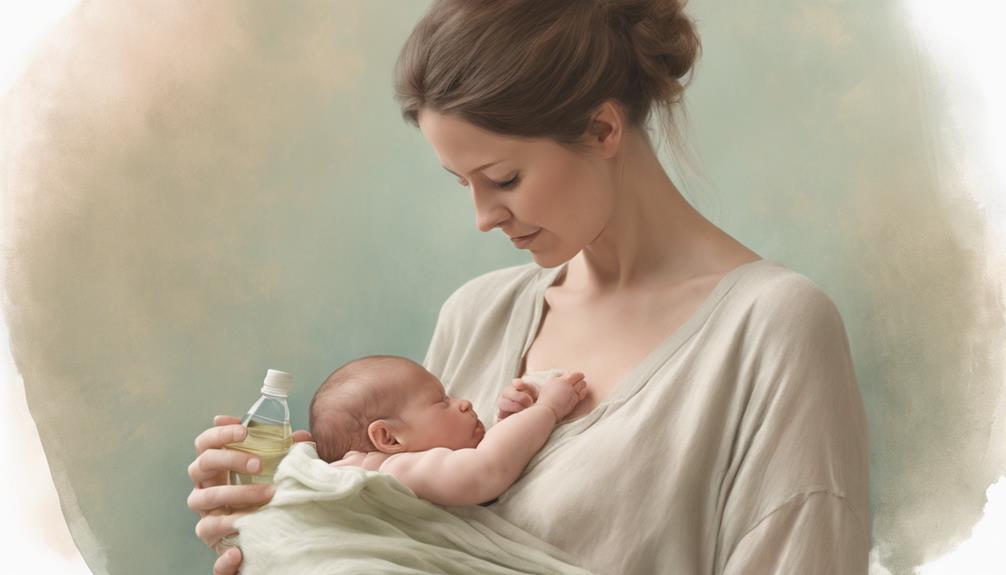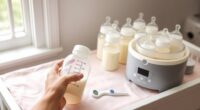If you've ever been puzzled by your newborn's persistent hiccups, there's a gentle and natural way to help ease their discomfort. Simple home remedies can work wonders in calming those unexpected hiccups that can disrupt your baby's peaceful slumber.
By implementing a few soothing techniques, you can provide relief and comfort to your little one in a safe and nurturing manner. So, why not explore these practical approaches to help your newborn find relief from hiccups without resorting to unnecessary interventions?
Key Takeaways
- Burping after feeding helps release trapped air, reducing hiccups.
- Create a calm feeding environment to soothe newborn hiccups.
- Using a pacifier after feeding can relax the diaphragm and prevent hiccups.
- Enjoy and cherish these small moments with your baby during hiccups.

Comfy Cubs Muslin Burp Cloths 20" x 10", Pack of 10 – Large, 6-Layer, Ultra Absorbent 100% Cotton for Baby Drool and Messes – Soft, Safe & Gentle Baby Burp Cloths for Boys & Girls – Multi
Soft and Gentle Baby Burp Cloths: Made from 100% breathable muslin cotton, these burping cloths are lightweight, gentle,…
As an affiliate, we earn on qualifying purchases.
As an affiliate, we earn on qualifying purchases.
Natural Remedies for Newborn Hiccups
If your newborn experiences hiccups frequently, trying natural remedies like burping after feeding may help release trapped air and alleviate this common occurrence. Burping is key as it assists in getting rid of any air your baby might've swallowed during feeding, which could be causing the hiccups.
Additionally, using a pacifier to encourage sucking can help relax the diaphragm and stop hiccups in newborns. It's important to remember that hiccups typically resolve on their own within 5 to 10 minutes and are generally harmless.
Avoiding gripe water for hiccups unless advised by a healthcare provider is recommended due to limited clinical evidence supporting its efficacy. Creating a calm feeding environment and ensuring you aren't overfeeding your baby can also contribute to reducing the frequency of hiccups.

Philips Avent Soothie Baby Pacifiers – 100% Silicone Pacifiers for Babies 0-3 Months, One-Piece Design, BPA-Free, Extra Durable, Green, 4 Pack, Model SCF190/41
Newborn pacifier 0-3 months supporting baby’s natural suckling need: designed to fulfill newborns' natural suckling reflex to self-soothe…
As an affiliate, we earn on qualifying purchases.
As an affiliate, we earn on qualifying purchases.
Wait It Out: Patience Is Key

As you observe your newborn experiencing hiccups, remember that allowing them to naturally resolve within 5 to 10 minutes showcases the effectiveness of patience in soothing your little one.
- Newborn hiccups usually resolve on their own within 5 to 10 minutes.
- Patience is key when dealing with newborn hiccups as they're typically harmless.
- Avoid rushing to intervene and allow the hiccups to stop naturally.
- Most newborns don't seem bothered by hiccups and may even find them amusing.
Newborn hiccups, though frequent, are generally harmless and part of your baby's development. While it might be tempting to jump in and try to stop the hiccups, waiting it out is often the best approach. Your baby's body is learning to coordinate breathing and swallowing, and these hiccups are a natural part of that process. So, sit back, take a deep breath, and enjoy these small, amusing moments with your little one.

Little Remedies New Baby Essentials Kit with Saline Nasal Spray, Diaper Rash Cream, Gas Relief Drops, Gripe Water & More, Safe for Newborns
Little Remedies New Baby Essentials Kit contains the essentials a new parent needs to safely and effectively tackle…
As an affiliate, we earn on qualifying purchases.
As an affiliate, we earn on qualifying purchases.
Burping Techniques for Relief

To help alleviate your newborn's discomfort and reduce the chances of hiccups, mastering proper burping techniques after feeding is essential. Regular burping plays a vital role in releasing excess air trapped in the stomach, which can contribute to hiccups in babies.
For bottle-fed babies, it's recommended to burp them every 2-3 ounces during feeding sessions. If you're breastfeeding, make sure to burp your baby when switching between breasts. These techniques are effective in preventing hiccups by minimizing the intake of air while feeding.
Burping not only helps in reducing the occurrence of hiccups but also aids in digestion and alleviates discomfort in newborns. By incorporating proper burping practices into your routine, you can contribute to a calmer and more comfortable experience for your baby, ultimately reducing the likelihood of hiccups.

Little Remedies Gripe Water for Babies, With Chamomile, for Baby Gas Relief, No Alcohol or Artificial Dyes, 4 Fl Oz
Gently relieves stomach discomfort from gas, colic, fussiness and hiccups*
As an affiliate, we earn on qualifying purchases.
As an affiliate, we earn on qualifying purchases.
Relaxation Tips for Soothing Hiccups

Mastering proper burping techniques after feeding your newborn is essential for releasing excess air and reducing hiccups. Now let's explore relaxation tips for soothing hiccups.
When your little one is plagued by hiccups, creating a serene environment is key. Here are some tips to help soothe those bothersome hiccups:
- Skin-to-skin contact: Holding your baby against your bare chest can provide comfort and help relax their body, potentially reducing hiccups.
- Calm environment: Ensuring a quiet and peaceful atmosphere can promote relaxation and aid in soothing hiccups naturally.
- Rocking motions: Gentle swaying or rocking your baby can help relax the diaphragm and may assist in stopping hiccups.
- Pacifier: Offering a pacifier for your baby to suck on can help relax the diaphragm and potentially reduce hiccups.
Pacifiers as a Soothing Aid
When calming your newborn's hiccups, consider pacifiers as a gentle aid to soothe and relax their diaphragm. Pacifiers offer a sucking motion that can help alleviate hiccups by calming the diaphragm and distracting your baby.
Placing your baby in an upright position while using a pacifier can also aid in releasing trapped air that might be causing the hiccups. The sucking action of a pacifier not only provides comfort but can also reduce the duration of hiccups. It's a non-invasive method that can be safely used to help your baby cope with hiccups comfortably.
Using a pacifier during or after feeding is particularly effective in preventing or stopping hiccups in newborns. Remember to pat your baby's back gently while they use the pacifier to further assist in releasing any air bubbles that could be contributing to the hiccups.
Frequently Asked Questions
What Can I Give My Newborn to Stop Hiccups?
To stop hiccups in your newborn, try using a pacifier to relax their diaphragm or burp them after feeding to release trapped air. Let hiccups naturally subside within 5-10 minutes. Avoid giving gripe water without consulting your pediatrician.
Is It OK to Lay Baby Down With Hiccups?
It's generally safe to lay your baby down with hiccups. If they're comfortable and not distressed, it's okay. Focus on a cozy sleep environment. Watch their behavior and comfort level for guidance. Hiccups usually pass on their own.
Do Hiccups Mean Baby Is Full?
Hiccups in babies don't necessarily mean they're full. Hiccups happen due to diaphragm contractions and air intake, not just feeding. They often resolve on their own and aren't a direct sign of fullness. Look for other cues to gauge hunger levels.
What Is the Best Position for Newborn Hiccups?
To soothe newborn hiccups, the best position is upright against your chest, head on your shoulder. This helps release trapped air and calms the baby. Keeping them slightly elevated during feeding also aids in reducing hiccups.
Conclusion
To sum up, soothing newborn hiccups naturally can be achieved with simple remedies like burping, skin-to-skin contact, and pacifiers.
Remember, patience is key when dealing with hiccups, and avoiding vital methods is important for your baby's well-being.
By using these gentle techniques, you can provide comfort and relief for your little one.
Keep calm, trust the process, and watch those hiccups disappear.









